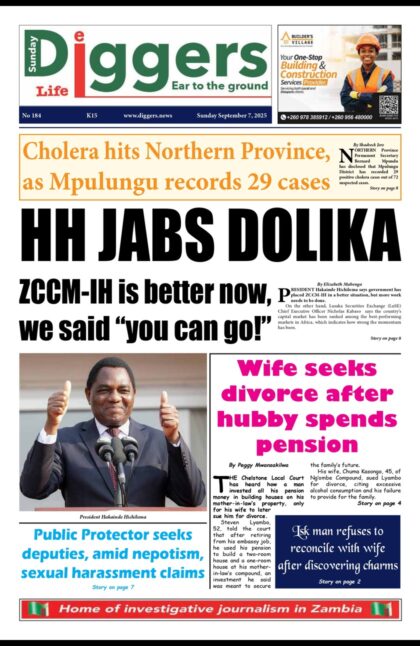Everybody in government is blaming social media for the bad publicity that they have suffered collectively and in their individual capacities. Whenever a scandal explodes and they want to downplay it, someone in government stand’s up to condemn social media. From the Head of State to the junior most Cabinet minister, no one has kind words for social media. It’s all lies, they say.
President Edgar Lungu: “Some people are using social media, especially Facebook to write letters insinuating that it is government officials issuing certain instructions which government is not aware of… bla bla bla
Minister of Information and Broadcasting: There is nothing sinister about a President being given a gift, but I do know now that people like to use social media to create stories even when there are no stories…bla bla bla!
Communication Minister Eng Brian Mushimba: “It is sad that something so powerful and innovative like social media can actually fall prey to the abuse where people are creating fake accounts to spread fake news and insult people, all the way to insulting the Head of State… bla bla bla!
Minister of Health Dr Chitalu Chilufya: “Social media has in the recent past days been awash with inflammatory stories purporting that the Ministry of Health has been discovered having been responsible for thefts of Global Fund commodities at Medical Stores. This is an old story…blab la bla!
Minister of Livestock Kampamba Mulenga: “Yes, we want democracy and freedom of expression to be upheld, but some individuals and groups have made it a point to spread lies on social media thinking it will get them to power… bla bla bla!
One would wonder; how do our ministers define social media when they sit in Cabinet to propose Internet regulation laws? What do they know about the invention of social media and the already existing International laws that govern the use of Internet? How ignorant are they about this animal called social media? Perhaps we must help them.
In simple terms, Social media is a computer-based technology that facilitates the sharing of ideas and information among friends and family, as well as virtual networks and communities. Just like it was during colonial days when citizens would get together and exchange greetings, information and lies, people today use this easy electronic communication system to send and receive greetings, videos, photos and lies; also known as ‘fake news’.
What the government of Zambia is saying is that it will no longer tolerate people telling each other lies. They want a society where one who tells what they consider a lie, is condemned to prison. How will the PF government create this Heaven on earth society, which even the messiah found and left?
It occurs to us that when they sit in Cabinet our ministers define social media as any medium that communicates negative news, be it radio, television, newspaper or the Internet – everything is just social media. What they don’t seem to understand is that when they say they want to regulate “Social Media”, it means controlling communication between two Internet devices that use any of the following worldly used software applications:
Facebook (2.167 billion users as of January 2018)
YouTube (1.5B)
WhatsApp (1.3B)
Facebook Messenger (1.3B)
WeChat (980M)
QQ (843M)
Instagram (800M)
Tumblr (794M)
QZone (568M)
Sina Weibo (376M)
Twitter (330M)
Baidu Tieba (300M)
Skype (300M)
LinkedIn (260M)
Viber (260M)
Snapchat (255M)
Reddit (250M)
Pinterest (200M)
So, what right does this PF government have to control what the citizens of Zambia share on these social media platforms? And assuming they succeed, how will it foster good governance when they stop people from tweeting what they please? There is confusion here that none of the people advocating for these Social Media reforms is capable of explaining.
We have challenged the government in the past to state if with the existing laws, they cannot arrest a social media user who insults the President, if with the existing laws, an online publication like ours cannot be sued for publishing false information about an individual. If the answer is positive, why then are they insisting on legislating Internet regulation laws?
Yes we agree that fake news is bad for any society, but who is going to define what is fake and what is authentic news? Most importantly who is going to punish the government when it lies to the people? As far as we are concerned, the majority of lies that have led to abject poverty in Zambia today are those originated by government. Just this month, a citizen from Kabwe sued the Patriotic Front for telling lies to the people of Zambia through campaign promises. The entire President lied through his teeth to the people of Zambia that he had officially reopened Mulungushi Textiles during a 2016 campaign in Kabwe, who is going to punish him for that lie?
Once again, our caution to the Patriotic Front government is that they should be very careful with the laws they are creating. We can clearly see that the move to regulate the use of Internet in Zambia suits these ministers because they are driving vehicles with flags today, and they don’t want anyone talking while they are eating. But they have not thought about these laws being used against them when their flags are taken over by a new regime, and they need unregulated social media to demand justice.
We belong to generation X, and we are not worried about this threat on social media, but we fear for these ministers who categorise anything they see on the internet as bad social media practice. When the tables turn, they will wish they never went ahead with these laws.
























